What rankles me, though, is the hectoring attitude of bookstore cultists like [Richard] Russo, especially when they argue that readers who spurn indies are abandoning some kind of “local” literary culture. There is little that’s “local” about most local bookstores... Sure, every local bookstore promotes local authors, but its bread and butter is the same stuff that Amazon sells—mass-manufactured goods whose intellectual property was produced by one of the major publishing houses in Manhattan. It doesn’t make a difference whether you buy Walter Isaacson’s Steve Jobs at City Lights, Powell’s, Politics & Prose, or Amazon—it’s the same book everywhere.
In the other corner you have Bookavore, the manager of indie bookseller
Word Brooklyn, who has... well, pretty mild-mannered words for Amazon and a list of ways she feels they could
be a bit less evil:
I don’t want to make lists of the reasons why Amazon sucks because I feel like I’m handing them a blueprint for rehabilitation.Many people want so, so badly to like Amazon, and many people already do. (See: comments sections on any article talking about Amazon.) Any effort they made towards making the world a better place would be embraced wholeheartedly by consumers and publishers, who mostly, when it comes right down to it, just want things to be con
My friend Carole Horne, general manager of the Harvard Book Store in Cambridge, MA, told me a story about this man who came into her bookstore last summer to browse. He thumbed his way through their “recommended” section, then came up to the cashier seemingly empty-handed. Nope. He put a five dollar bill on the counter and said that he was going on a trip and would download his books but had spent a lot of time browsing and felt like he owed the shop some money.
The story is a mixed bag, but there is a measure of good in it. The guy recognized the intrinsic worth of the local bookstore. This time he forewent its paper products that would weight down his luggage. But he did value the expertise of independent bookstore buyers, the taste of those who curated that special section of books worth his attention, the opportunity to look into familiar books to see if they appealed and browse unknown ones to find a treasure. And at least it translated into some value for the store as well.
A worse story. This week I was picking up a book and a calendar (yes, I still write down my appointments in little white squares) at nearby Brookline Booksmith and noticed a shopper jotting down titles on a list next to people’s names. Wanna bet that list is going home to a computer and amazon.com?
The WORST story. Quite simply, the Amazon app. For those of you who haven't heard or read about it, Amazon has created an app called, “Price Check.” People go into stores, enable the app’s location feature, scan products using their phones and are immediately offered 5 percent off 3 identical Amazon purchases for up to 5 dollars. In other words, the app is turning brick-and-mortar stores into unwilling showrooms where consumers can check out the product, and leaf through a few pages before they click a button to save five bucks (plus, don’t forget, the sales tax!)
Right now, Price Check (or as I see it, the Death Star) is only using consumers as its foot soldiers to do reconnaissance on products like electronics, toys, music, sporting goods, and DVDS. Then, with a click, it sucks up this market. How long before books, the product that defined Amazon, will follow? Then how long before all our favorite bookstores will no longer exist?
People in all parts of the book business know something about death by a thousand cuts. But writers—especially kids’ book writers, especially nonfiction kids’ book writers—know that losing local bookstores is more like the Sword of Damocles. The pricelessness of booksellers has been written about so often, I’ll just print the keywords and you can fill in the blanks: know their stock standards, take chances, word of mouth, hand sell, actually read, actually care.
Let's not lose all those beautiful keywords for five bucks and some sales tax.
Come on everybody, it’s the Christmas buying season. There will
 My favorite local bookstore, Wild Rumpus is participating in Take Your Child to a bookstore day. If you live in the Twin Cities, you must check this place out, they have cats and chickens that roam the store while you shop!
My favorite local bookstore, Wild Rumpus is participating in Take Your Child to a bookstore day. If you live in the Twin Cities, you must check this place out, they have cats and chickens that roam the store while you shop! Tomorrow (Dec.3rd) is the 2nd annual Take Your Child to a Bookstore Day, have you heard about it? It's purpose is to not only support independent booksellers, but to give children the opportunity to spend time in a bookstore around the holidays. It's so easy to shop online, something I am very guilty of! But the experience of browsing through the shelves and hand selecting titles is so special.
I honestly wish that we didn't even need to have a specific day to reinforce the importance of this kind of experience, every day should be bookstore day! But it's nice to have a yearly reminder, especially around the holidays.
Will you be taking the child/children in your life to a bookstore tomorrow? If you are interested, this
website has a list of the participating bookstores through out the country.
Image Source
Stages on Pages
On Thursday, November 10th, Books of Wonder is delighted to present 7 authors who have written new books for teens that feature young people involved in one way or another with the performing arts. Joining us will be debut author SHELLA CHARI to share Vanished, the story of 11-year-old Neela, who's determined to protect an antique Indian stringed instrument that's a family heirloom which she dreams of playing for delighted crowds someday; author BARBRA DEE will present her new novelTrauma Queen, about Marigold, a teen girl who's constantly embarrassed by her infamous stage actor mom; debut author SOPHIE FLACK will take us into the exclusive world of the Manhattan Ballet Company as we follow one aspiring dancer persuing her dreams in Bunheads; SARA LEWIS HOLMES will present Operation Yes, about a sixth grade class on an army base with a new teacher who uses improvisational theater to teach and inspire them and how they come together to help their teacher when her brother goes missing while se
Here are some tips to attract people to your book signing.
http://1stturningpoint.com/?p=6805
Slate says it wasn't the Internet that killed Borders. But it is deader than a doornail, no matter what did it in.
Borders was the first bigbox chain bookstore to open near me. I loved it. I was totally blown away by all the books. And the big, cushy chairs. Back in those days, Borders would bring in entertainment, musical groups on a Friday night, say. Independent bookstores had already become scarce around here, so Borders was filling a need.
What cooled me on Borders was the sameness. The policy of using national buyers and carrying the same thing in every store meant that whether I was in a Borders in Connecticut or Delaware or New York or, later, Vermont, I always saw the same books, presented in the same way. And since Barnes & Noble does the same, and it was opening stores in the same areas Borders was, I'm just talking the same, same, same in every store wherever I was.
When you go into a privately owned, independent bookstore, you can almost feel you know something about the people who run the place, because they have chosen the books on display. They didn't just open a case that was sent to them and put the merchandise on the shelf. What might save Barnes & Noble (assuming it needs saving) is to follow a similar policy. Give up using national or regional buyers so that only a few books get a lot of display space and allow the local store managers to do their own purchasing. Shoppers will always be able to get the bestsellers for less at Amazon, so give them something different in the stores, something that surprises them and that they want right then.
Over twenty years ago, I walked into the most amazing bookstore. It was enormous, easily three times the size of any bookstore I'd been in before. Books were everywhere, piled high from floor to ceiling. I didn't know there could be so many books in the same place. This was before big box stores. Before the store turned into a big corporation. It was just a neighborhood bookstore back then, but the biggest and most exciting I'd ever seen.
 Over the years, I visited that store many times. I watched it move to a larger space, and become even bigger, and if possible, more exciting. I listened to authors, browsed foreign newspapers, read comic strip collections over by the coffee bar and so much more. I found all kinds of books I didn't know existed, including a series about a wizard named Harry. And a few years after that, I waited in line at midnight to buy the 4th book in the series.
Over the years, I visited that store many times. I watched it move to a larger space, and become even bigger, and if possible, more exciting. I listened to authors, browsed foreign newspapers, read comic strip collections over by the coffee bar and so much more. I found all kinds of books I didn't know existed, including a series about a wizard named Harry. And a few years after that, I waited in line at midnight to buy the 4th book in the series.
Say what you will about Borders. Yes, it was a big corporation. Yes, it took business away from the small, local bookstores I support so avidly. Yes, it grew too quickly and probably sacrificed some quality along the way. But, despite that, it got people excited about books. And it never ceased to amaze me that the public could support the existence of such a large place... just dedicated to books.
Well, that time has come and gone. Borders is being forced to liquidate, after all hopes of salvation from bankruptcy have fallen apart. 11,000 employees are losing their jobs and nearly 400 bookstores are closing. And that's bad news for all of us in the book business.
I'll miss that exciting store that always made me smile. How about you? What are your thoughts about the end of this major chapter in the book industry?
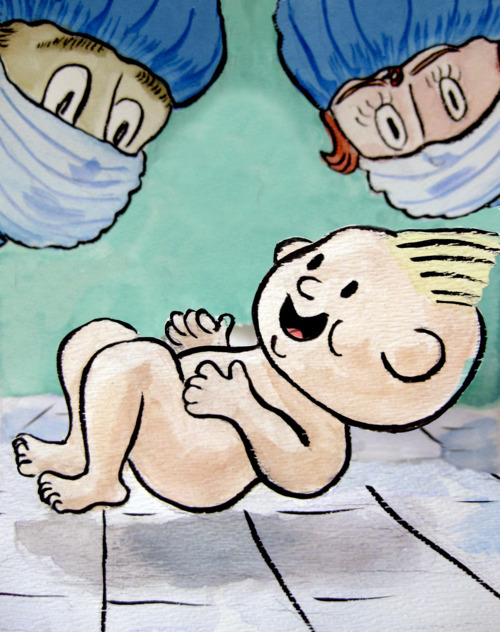
Little Johnny Brown could not touch the ground, but he will go to Beijing and try to get published.
The time has come for Becky and I to head off on our Summer travels. The weather is so darn hot here in Zhejiang province that we have decided to head north and look for cooler climes, and some book deals. Our first stop is Beijing where are very happy to be meeting with some publishers to see if any are interested in publishing all of our Moo-Cow Fan Club work to date (all 16 issues of the magazines and the two books). While there I’ve also decided to pitch my two new picture book ideas to them. The image above is a concept illustration from one called Little Johnny Brown Could Not Touch the Ground.
Regardless of how the pitches go, I’m very excited to get an inside look at the way the publishing industry here works (we’re getting some tours too). As with everything in China, it is growing extremely fast as anyone who has been to a mega-bookstore in a major city here can tell. You walk into one of these stores and it’s like someone’s made a high-rise by stacking a Barnes and Noble, Borders and Books-A-Million on top of each other. SO - MANY- BOOKS!
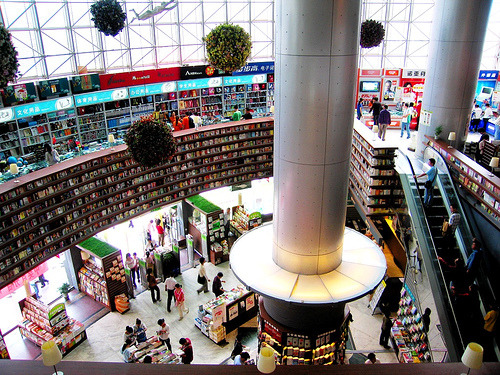
Here is a Airport sized bookstore in Nanjing. Photo Credit: John Meckley
The major problem with the industry here is not that people are not reading (there are more literate Chinese people now then ever before in history) it’s the seemingly futile struggle against piracy. Downloading whatever you want for free is just how everyone gets pretty much everything in China. Even official government organizations will just download software, movies, books, etc. The biggest web company in China, Baidu, actually offers a place for people to download books that have been uploaded by users. There have been a lot of recent moves against this kind of thing lately, even Han Han, China’s biggest and most influential blogger and writer, has gotten involved, but it will be a long time before piracy is not the norm here for all entertainment industries.
Luckily for us, all over the world kids books are something to be physically held and read by the child, so I’m not so worried about all of that.
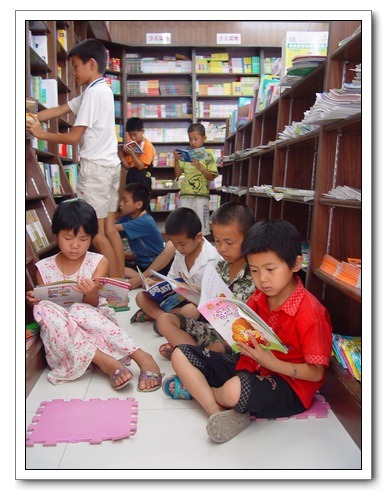
The kids are alright. Photo Credit: Stian
So, our first stop is Beijing and then it’s off to Inner Mongolia! I’ll keep you updated and share some pictures throughout our journey.
Normal 0 false false false EN-AU X-NONE X-NONE ...
Read the rest of this post

By: Laura,
on 5/17/2011
Blog:
the pageturn
(
Login to Add to MyJacketFlap)
JacketFlap tags:
Authors,
Picture Books,
animals,
bookstores,
Illustrators,
Minneapolis,
Wild Rumpus,
Katherine Hannigan,
Michael Hall,
Hennepin County Library,
Charles Benoit,
Books,
Add a tag

A bookstore cat
Let’s be honest. The bookstore cat is cliché. Don’t get me wrong. I love cats, and I love cats in bookstores. There’s a reason why they are cliché. Bookstore cats are well-behaved (mostly) and safe (again, mostly) in exactly the way that a bookstore mongoose or bookstore badger is not. Still, I pine for variety now and again. And that brings us to my favorite local children’s bookstore, Wild Rumpus.
Wild Rumpus is nestled in Linden Hills. Linden Hills is nestled in Minneapolis. And within Wild Rumpus is nestled… other things. There’s a whole lot of nestling going on. It’s like a Russian doll thing, in indie bookstore form. Those other things include Mo the Dove, Amelia and Skeeter (a pair of chinchillas), Spike the Wise Lizard (which sounds like a Toad the Wet Sprocket cover band if you ask me), parakeets, chickens (that roam the store freely), and yes, even a cat or two (of the stylish Manx variety).

A chicken climbs a display for PERFECT SQUARE and MY HEART IS LIKE A ZOO, both by local author/illustrator Michael Hall
In addition to housing this menagerie, Wild Rumpus sells books. Really good books. I get the majority of my children’s and YA books from my excellent local library system. But when I absolutely positively can’t wait for my hold to come in, I go to Wild Rumpus. When I do, I also have to watch my wallet because of the temptation to bring the entire contents of their shelves home with me.
Wild Rumpus offers a weekly story time on Mondays and book clubs for all ages. Their ARRG! (that’s Advanced Reader Review Group) recently read YOU by Charles Benoit, one of my favorite books of 2010. I’m a librarian by training and inclination, so I sometimes get nervous when bookstores offer traditional library programs like book clubs and story times. But when the bookstore staff loves children’s literature–as the Wild Rumpus’ staff so clearly does–it’s hard to take offense. Hungry readers benefit libraries and booksellers alike.
I know I’m preaching to the choir when it comes to you Twin Cities readers, so this is for the rest of you. If your travels take you to Minneapolis, let your wild rumpus begin!
~Tony
p.s. Katherine Hannigan, author of TRUE (…SORT OF) and
My preteen son and I ventured into New York during spring break to ride the Staten Island Ferry and visit a couple of favorite bookstores. He loves Kinokuniya, the big, ultra-busy Japanese store across Sixth Avenue from Bryant Park. He chose a cool pen and some art supplies from the many cool pens and art supplies on the lowest level, and later used the pen to impress a seven-year-old girl on the train ride home. "You write cursive!" she exclaimed.
I wanted to visit a small shop I knew of only through social media; the store and I may even have exchanged tweets. Along with many others, I have promoted buying books at independent bookstores, and I'd been curious about this one since it opened. It's a well-lit, appealing spot with what looks like carefully selected inventory.
We were the only customers at the time of our visit. A bookseller behind the counter glanced up from the computer as we entered and we exchanged hellos.
"I follow y'all on Twitter," I said excitedly.
"Oh," said the bookseller.
Silence followed.
After a few seconds, I understood that our conversation was over.
Feeling vaguely embarrassed, I began to look around.
Someone else was working on a computer in the back of the place. I wondered if the two store folks, separated by 300 feet or so, were emailing each other instead of talking back and forth. Maybe I should have logged into Twitter on my phone to speak to them.
ST: U are friendly on Twitter! Why not here?
Employee#1: I'm not the Twitter person.
Employee#2: Comeoutoftherain,makeyourselfathome,iloveyou. Please retweet.
I bought several books, but left feeling disappointed—and duped. Social media got me there, but I'm not rushing back any time soon.
I'm not a big fan of bookstores.
Let me clarify: I'm not a big fan of big chain bookstores.* Small bookshops, especially those with live cats (we have two indie shops with feline "employees" in Lawrence), are great. Used bookstores are heaven. I've blogged about them before.
One staple of the big chain store is the remainder table.
How depressing.
Last week, as part of spring break, we spent a short stint in Kansas City. I took the boys to a bookstore (plenty to look at and they were pumped). I picked up a $2 book on a remainder table and read the bio of the author. Her short fiction credits included The New Yorker, Zoetrope...big names. The cover even heralded "New York Times Bestselling Author".
On a remainder table. For $2.
Depressing...
I dream of a world with no remainder tables. An unexpected bonus of the e-book, I suppose.
*I do feel bad for all those folks who lost their jobs with Borders.*
**But I have a friend, a rabid book lover, who thumbs his nose at the other big chain bookstore in Lawrence but he loves Borders. Really? I can't really understand.
 I want your opinion today.
I want your opinion today.
Last month most book lovers noted the bankruptcy filing by Borders, one of the nation’s largest book store chains. They closed about 200 stores, or 30% of their locations. We keep hearing that bookstores are heading in the same dismal direction as video rental stores or record stores.
Does It Matter?
Over the weekend I read a thought-provoking article called “The Marketplace of Ideas: Why Bookstores Matter.” It was one man’s answer to the very real possibility that physical bookstores may become a thing of the past with the advent of Amazon, e-readers, and deep discounted books at Wal-Mart.
After quoting several businessmen and business writers on the inevitable demise of the brick-and-mortar bookstores, he talked about why bookstores were critical to him as a reader and a writer–and to our communities.
The whole article is worth reading, but here are a few things he said:
- Being in a bookstore helps me to think. I find that my mind makes connections between authors and books and ideas as I walk along the shelves and look at the tables. When I get a case of writer’s block, I head for a bookstore. The experience of walking among the books is curative.
- Printed books are physical objects that cry out to be handled even before they are read. The physicality of the book is important to the experience of the book itself. The arrangement and order of the words is supreme, but the appearance of the book and the feel of the book in the hand are also part of the reading experience.
- The loss of the bookstore will mean more than lost opportunities to sell books, however. For the last two centuries and more, bookstores and bookstalls have been centers for the dissemination of culture and ideas. Books are about ideas, and bookstores offer a rare context for meeting other people interested in ideas.
Your Opinion
Is there a “magic in bookstores” for you? How do you feel about bookstores, both the chains and local book shops that are more intimate? Was there a bookstore somewhere in your past that holds great memories for you?
If physical bookstores disappeared–as many are saying they will–what would that mean to you?
Please leave a comment.
View Next 25 Posts
![]() In her first guest post, author/illustrator Christy Hale shared ideas for how to plan a successful book launch. In her follow-up post, Hale shares tips for planning storytelling and activities for bookstore appearances. Hale is the author and illustrator of, most recently, Dreaming Up, which was named a 2012 ALA Notable Book by the American Library Association and one of the Horn Book Magazine‘s Best Books of 2012.
In her first guest post, author/illustrator Christy Hale shared ideas for how to plan a successful book launch. In her follow-up post, Hale shares tips for planning storytelling and activities for bookstore appearances. Hale is the author and illustrator of, most recently, Dreaming Up, which was named a 2012 ALA Notable Book by the American Library Association and one of the Horn Book Magazine‘s Best Books of 2012.


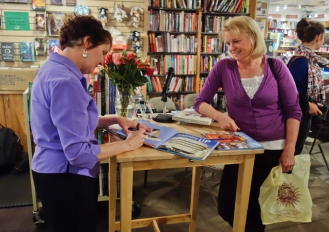
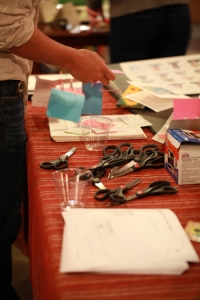
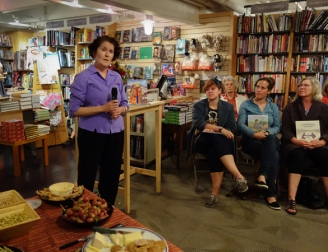
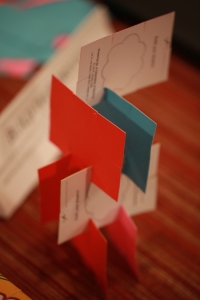
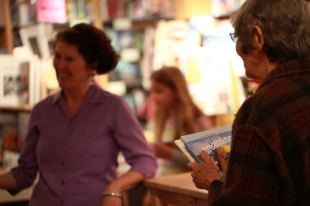


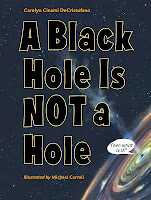













 I want your opinion today.
I want your opinion today.
[...] Next: How to Plan a Successful Book Launch, part II: Storytelling and Activity Ideas [...]